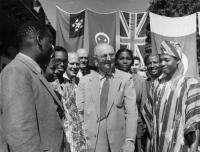Speaking three years later to Nigerian students, he said, "I know it was a bombshell when the news was given out that I was going to Caux. Accusations were made against me, but I did not mind because my conscience told me it was the right thing when I saw what was being done there to salvage humanity. I became attracted to Moral Re-Armament because I felt those who were preaching it were also living it.. .'19
Azikiwe became the first Governor-General, and then President of independent Nigeria. After his initial visit to Caux he several times called on Buchman. When he saw him in London on 19 May 1960 he said that, while he could not claim to have lived up to Moral Re-Armament standards, his visit to Caux had given him a new perspective. He had always wanted to be the first Prime Minister of Nigeria. He was, when Independence was declared, Premier of the Eastern Region. He had been offered the Prime Ministership of Nigeria if he would combine with the West against the North, but had refused, as he felt it would mean the eventual break-up of Nigeria. Instead he accepted the figure-head position of President, while a Northerner became Prime Minister.

Buchman also made a considerable impact on one of the men at the heart of the black nationalist movement in South Africa. William Nkomo had been first President of the Youth League of the African National Congress, a group of younger men who felt that the main body was moving too slowly and peaceably. In 1953 he went to a Moral Re-Armament conference in Lusaka, capital of what was then Northern Rhodesia, and was deeply affected by hearing and meeting George Daneel, the Afrikaner sportsman and Dominee who had met Buchman in 1929. The following year Nkomo came to Caux where Buchman made friends with him and, for reasons best known to himself, dubbed him 'Diamond Dick'. 'Diamond Dick', a robust figure sporting the small pointed beard which was the badge of nationalism, felt thoroughly at home in the atmosphere of Caux and responded to a view wider than only his own country and people.
Buchman, with his combination of realism and optimism, expected such men to understand his aims, and as the years went by there was a steady flow of revolutionary leaders from Africa to Caux and Mackinac. Nkomo describes Buchman speaking one evening at Mackinac after the first performance of a new play which he and his African colleagues had recently written, The Next Phase. 'He said to the audience, "You have been listening to saints of Africa." He called us saints even though he knew us to be rascals. That challenged us more than anything could do. None of us had a restful sleep that night. We went through our own lives and saw the places where we needed to be different.'20
458
Photo: Buchman with delegates at Caux from Nigeria, Kenya and South Africa, in 1952.
©Jeremy McCabe LBIPP/MRA Productions